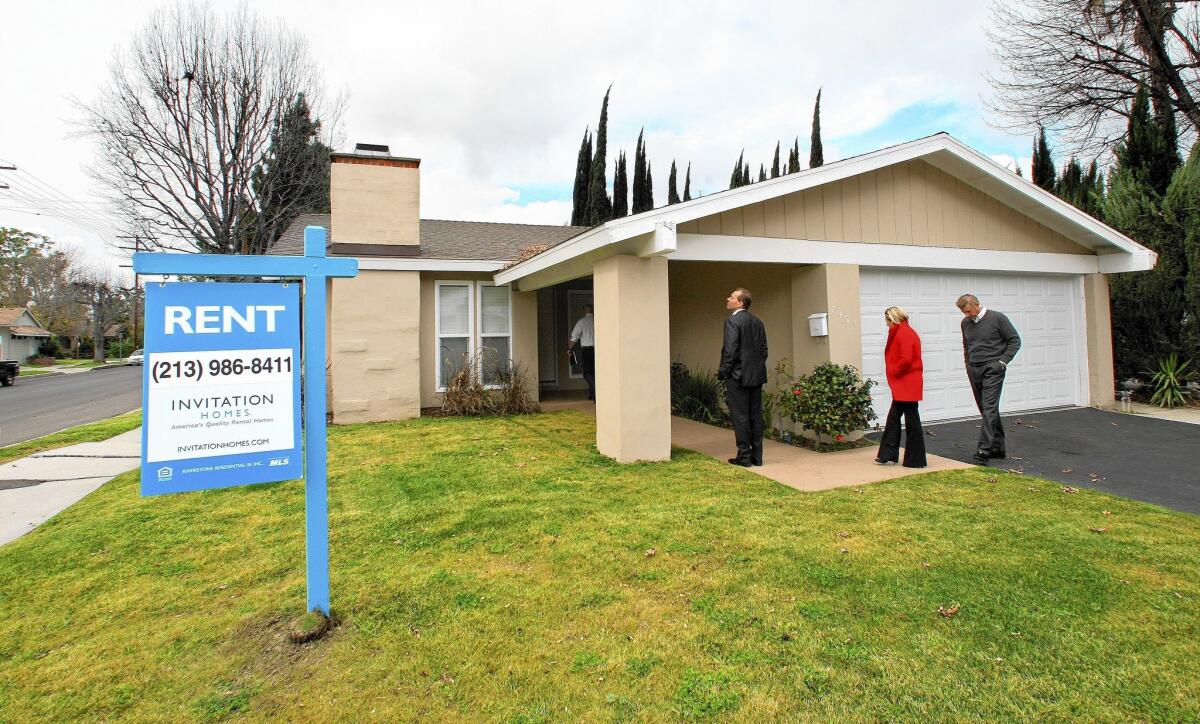Single-family rental rivals Invitation Homes and Starwood Waypoint Homes to merge

Two of the nation’s largest owners of single-family rental houses announced Thursday they are merging, creating a behemoth rental company with a major presence in Southern California.
The deal between Invitation Homes and Starwood Waypoint Homes comes as home prices have risen across the country and reflects the difficulty that such giant rental firms face in growing. Gone is the deluge of cheap foreclosures that propelled their rapid expansion early this decade, prompting a wave of industry consolidation.
For the record:
1:59 p.m. Nov. 15, 2024An earlier version of this story said that Starwood Waypoint was a product of a merger last year involving Colony Starwood Homes. It actually resulted from a merger involving Colony American Homes.
The union is the highest-profile and largest merger yet, creating a company with an industry-leading 82,000 homes nationwide. Starwood Waypoint, based in Scottsdale, Ariz., itself was a product of a merger last year, when Colony American Homes combined with Starwood Waypoint Residential Trust.
American Homes 4 Rent of Agoura Hills also merged in 2016 with American Residential Properties, also of Scottsdale. American Homes was the largest owner of single-family rentals with 48,400 homes as of the close of the second quarter, slightly more than Dallas-based Invitation Homes, according to Green Street Advisors, a Newport Beach research firm.
As home prices have risen, the companies have significantly slowed their purchases, especially in high-cost markets such as California, which was an early center of their buying sprees.
According to CoreLogic, the median price in Southern California was $500,000 in June, up 67% from 2012 — the year private equity giant Blackstone Group launched Invitation Homes.
“They can’t acquire in scale like they could,” said John Pawlowski, an analyst with Green Street Advisors.
The push to grow also has been driven by a desire to concentrate properties in certain markets so that home management and maintenance can be done more efficiently, according to a report last year from Keefe, Bruyette & Woods Inc.
Pawlowski said that by adding more homes, the companies can negotiate better deals with repairmen, Home Depot and other vendors. And concentrating houses in certain markets makes it far easier to oversee multiple properties with fewer on-the-ground managers.
Pawlowski said managing 82,000 homes five years ago would have been extremely difficult, but online management systems have improved to the extent that a deal between Invitation Homes and Starwood Waypoint makes sense.
“This merger creates the leading single-family rental company in the United States, which will be uniquely positioned to deliver exceptional service to residents, while also improving operating efficiency,” said Fred Tuomi, chief executive of Starwood Waypoint, who will lead the new firm under the Invitation Homes name.
The deal gives the new firm a concentration of houses in Florida and the West, including more than 12,700 in California. Still, the company’s national portfolio would just be a sliver of the nearly 16 million single-family homes for rent in the United States.
Historically, the single-family rental industry has been the domain of mom-and-pop landlords. But in the wake of the subprime mortgage crisis, large Wall Street firms such as Blackstone rushed into the market to acquire homes at rock-bottom prices.
The rush of investors was credited with helping home prices recover in some markets.
Derek Oie, a local real estate agent who has worked with Invitation Homes and Starwood Waypoint, said when the companies started buying homes in the Inland Empire neighborhoods he specializes in, there were still heaps of foreclosures and short sales.
“The market needed these guys to come in,” he said. “There still wasn’t enough buyers in the marketplace. It probably would have taken 10 years to clear out [the distressed homes]. They cleared it out in 2 ½ to 3 years.”
In addition to California being an epicenter of early purchases, the industry has other ties to the state. American Homes 4 Rent was founded by billionaire B. Wayne Hughes, who decades ago started Glendale’s Public Storage Inc.
L.A. billionaire Thomas J. Barrack Jr.’s private equity firm launched Colony American Homes in 2012. Earlier this year, Barrack — a close friend of President Trump — cashed out of Colony Starwood Homes, which changed its name to Starwood Waypoint Homes following his departure.
At the beginning, there was debate whether the companies were in the business for the long haul or if they would quickly unload their homes as soon as prices rose.
Increasingly, it’s becoming clear they are here to stay. Earlier this year, Invitation Homes went public, joining American Homes 4 Rent and Starwood Waypoint on the public markets. And Fannie Mae, the government-controlled mortgage giant, agreed to back a $1-billion loan to Invitation Homes.
“The question was is this a trade or is this a business,” said Kevin Dwyer, an analyst with Morningstar. “This is a business…. I would be very surprised if they all went away.”
The companies have benefited from a shift toward renting following the financial crisis. Despite a recent uptick in homeownership, the nation’s ownership rate stood at 63.7% last quarter, down from a high of 69.1% at the beginning of 2005. And in many pricey metropolitan markets, such as Los Angeles, would-be buyers are increasingly being priced out.
But as the companies profit, they have faced reoccurring questions over whether they could properly maintain tens of thousands of homes spread out across the country. In June, Reveal, an outfit of the Center for Investigative Reporting, published a story that detailed what it said were problems with maintenance at Starwood Waypoint houses.
In response, the company said it received high satisfaction marks from customers in a recent survey and plays “an important role in providing high-quality and affordable rental housing for thousands of Americans.”
Dwyer of Morningstar said that the companies take complaints over maintenance seriously and that his research doesn’t indicate widespread neglect.
“We certainly don’t see that in a systematic way,” he said.
The deal announced Thursday is a 100% stock swap between Invitation Homes and Starwood Waypoint. After closing, expected by the end of the year, Invitation Homes shareholders will own 59% of the firm, with Starwood Waypoint shareholders controlling the remainder.
The new company would be valued at $11.3 billion based on Thursday’s closing stock prices.
Invitation Homes saw its shares rise 3.9% to $21.81. Shares of Starwood Waypoint rose 5.2% to $35.35.
Follow me @khouriandrew on Twitter
UPDATES:
3:35 p.m.: This article was updated with comments from an analyst and real estate agent, as well as additional details.
10:35 a.m.: This article was updated with additional background on the deal and the single-family rental industry.
This article was originally published at 9:45 a.m.
More to Read
Inside the business of entertainment
The Wide Shot brings you news, analysis and insights on everything from streaming wars to production — and what it all means for the future.
You may occasionally receive promotional content from the Los Angeles Times.











